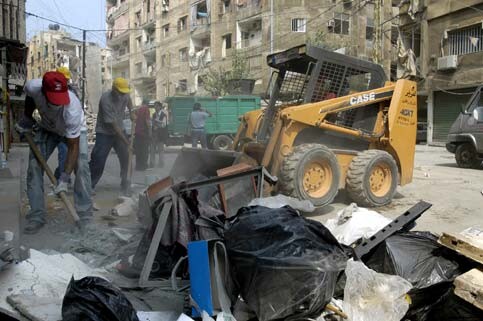UN Office for the Coordination of Humanitarian Affairs 21 August 2006

Workers clean the rubble created by Israeli attacks on Al-Dahieh, south of Beirut, August 19, 2006. (MaanImages/Payam Borazjani)
Lebanon response OCHA situation report No. 28
KEY DEVELOPMENTS
Swedish Development Minister visits Beirut
The Swedish Development Minister, Carin Jamtim, arrived in Beirut today for a two-day visit principally in preparation for the 31 August Stockholm conference on Lebanon. He accompanied the UN Humanitarian Coordinator to inspect first-hand the damaged areas of southern Beirut this morning.
SITUATION OVERVIEW
1. Figures from the Government of Lebanon’s (GoL) Higher Relief Council (HRC) continue to remain static at 1,183 killed and 4,054 injured.
2. Mr. Vijay Nambiar, Special Advisor for the UN Secretary-General, and Mr. Terje Roed-Larsen, the Special Representative of the Secretary-General for the Implementation of Security Council Resolution 1559, completed their two-day mission to Lebanon today. The delegation conferred with Lebanese Prime Minister Fouad Siniora and other senior officials “to discuss the means of implementing Security Council resolution 1701 for a long term cease-fire between Lebanon and Israel”.
Returns Update
3. UNICEF reports that the return of Lebanese refugees from Syria has slowed down through all checkpoints. The most frequented crossing point is the Yabouz crossing, which is closest to Damascus.
UXO/Mine Clearance
4. The UN Mine Action Coordination Centre (UNMACC) is sending reconnaissance teams through damaged areas in southern Lebanon to locate cluster bomb strikes. Fifty-one individual strike locations have been confirmed with the teams having covered approximately 40% of damaged areas thus far. The total number of strikes is expected to rise to over 200. In addition, at least 20 air-dropped bombs, ranging in size from 500lbs to 2,000lbs, have been located.
5. The UNMACC has estimated that it could take 12 months to clear UXOs from southern Lebanon.
HUMANITARIAN RESPONSE
Logistics
6. WFP reports two convoys moving today: one bound from Tyre to Ayta Al Chaab with three WFP trucks and four UNICEF trucks carrying relief supplies. A second convoy of eight WFP trucks is traveling from Beirut to Houla.
7. The GoL vessels, Gulf Nomad and West Point, continuing offloading fuel in Beirut and Tripoli respectively. The Italian vessel, San Marco, is arriving today with WHO and WFP relief supplies. The Roll-on Roll-off (RoRo) vessel, Anamcara, will proceed to Beirut from Limassol tomorrow. The Turkish vessel, Kazim Genc, has completed offloading and departed Beirut today.
8. Aid groups conducted their first General Humanitarian Coordination meeting in Tyre yesterday. Cluster meetings on Shelter and Watsan will be held today, with Protection and Food being held tomorrow.
Assessment Missions
9. An interagency assessment mission has traveled to Markabe, Houle, Meiss El and Jabel with preliminary findings indicating: a lack of water and power; sporadic communications with some damage to the landline and cellular networks; as well as extensive destruction to other infrastructure including roads, fuel stations, commercial properties, schools and health facilities and extensive destruction to civilian homes. In Markabe, the damage was very extensive with 50% of buildings destroyed and most others damaged but repairable. The urgent need is the provision of water, food, shelter support. Most IDPs have found immediate accommodation with extended families and neighbors.
10. An interagency assessment mission, based in Saida, has visited Nabatiyeh and found that while the damage is not as extensive as in Tyre, there are numerous UXO and with approximately 50% of the housing destroyed.
11. A UN team consisting of representatives from OCHA, UNICEF, WFP, UNFPA and UNRWA undertook a rapid field assessment of the Beka’a Valley from 16 to 19 August. The team visited towns and villages to view the conditions of IDPs and returnees, service centers and to assess bomb damage. The team met with local governor representatives, parliamentarians, NGOs and families in the western area of Zahle and the Baalbek districts of the Beka’a Valley. Initial findings show that the number of IDPs was modest with most returnees now housed with friend and relatives or in damaged buildings. While factories had been bombed leaving workers unemployed in all the districts of the Beka’a Valley, the most significant infrastructural damage was in the Baalbek/Hermel area. In all the districts, food has been provided to those in need by the community, supplemented by humanitarian relief agencies and the WFP. There are some reports of drug shortages, especially for treatment of chronic diseases. A final quantification of need is underway at the governorate level and will be completed by 25 August, when it will be made available to the humanitarian agencies through the cluster groups.
Food Aid
12. WFP has delivered a total of 1,815mt of food (including wheat flour, vegetable oil, canned meat and high-energy biscuits) to more than 400,000 people since 24 July.
Health
13. WHO has announced that over 54 volunteers have been mobilized so far to South Lebanon and South Beirut to assess public health facilities. An additional 16 are expected to be mobilized today and tomorrow. Due to reported incidents of hostilities (in the Beka’a area on Saturday), assessment visits to health facilities in Beka’a were put on hold until further notice.
14. During the joint UN assessment yesterday to Nabatiya, two main hospitals were visited. Both reported a satisfactory amount of drugs and other supplies, and no or very little damage. As a result of the visit, WHO is looking into supporting the hospitals to ensure generators are fully functioning and fuel is continuously available
Water and Sanitation (WatSan)
15. UNICEF will continue to supply bottled water in large quantities (10 trucks a day, with each vehicle carrying 10,000 liters of water) for another 12 days. The water will meet the daily needs of some 35,000 people. The WatSan cluster is developing a list of prioritorized distribution site.
FUNDING
Flash Appeal
16. The UN Flash Appeal for the Lebanon crisis remains almost 54% funded with contributions of almost US$ 89 million, while additional US$ 6.39 million has been pledged.
Related Links